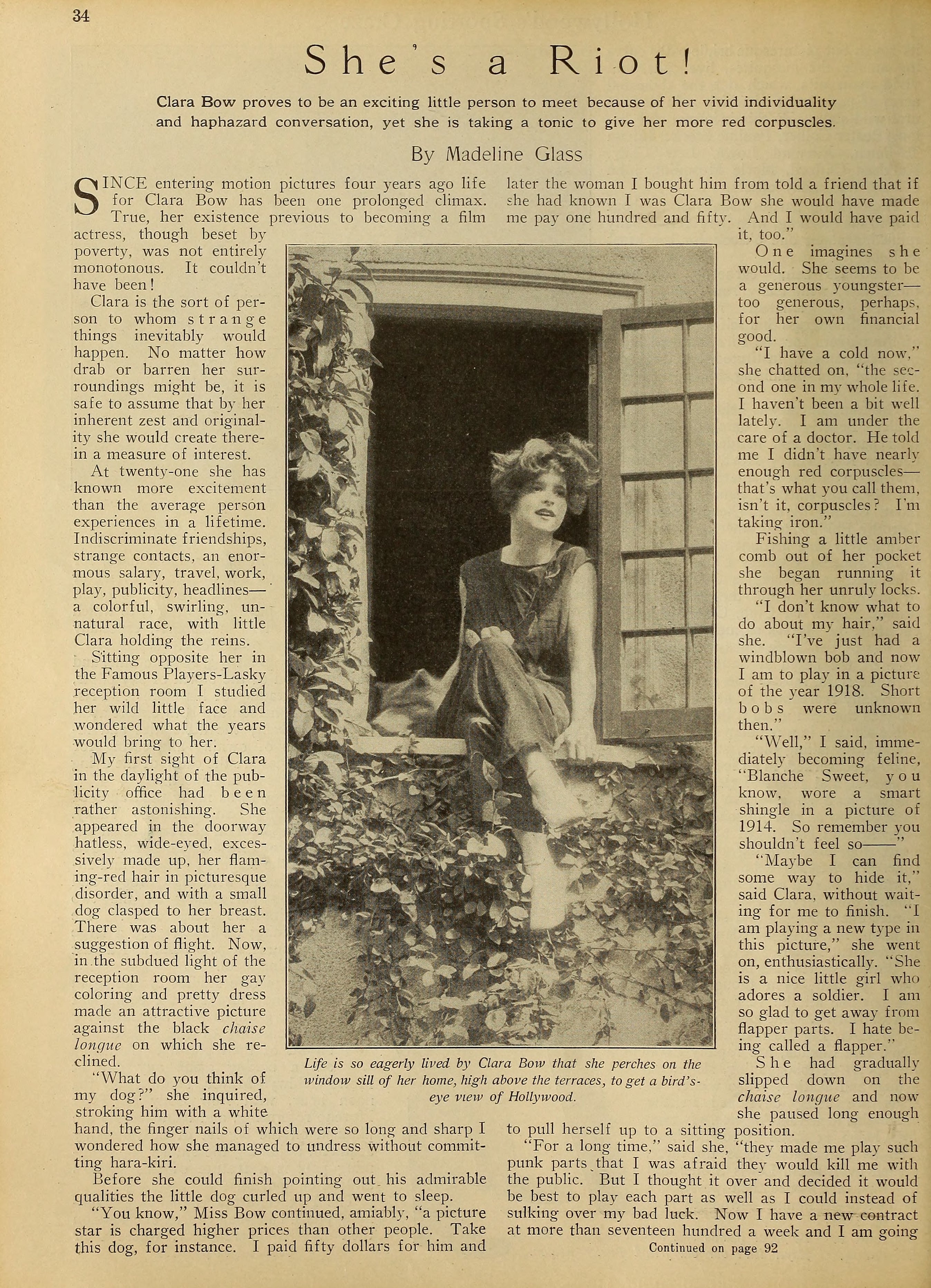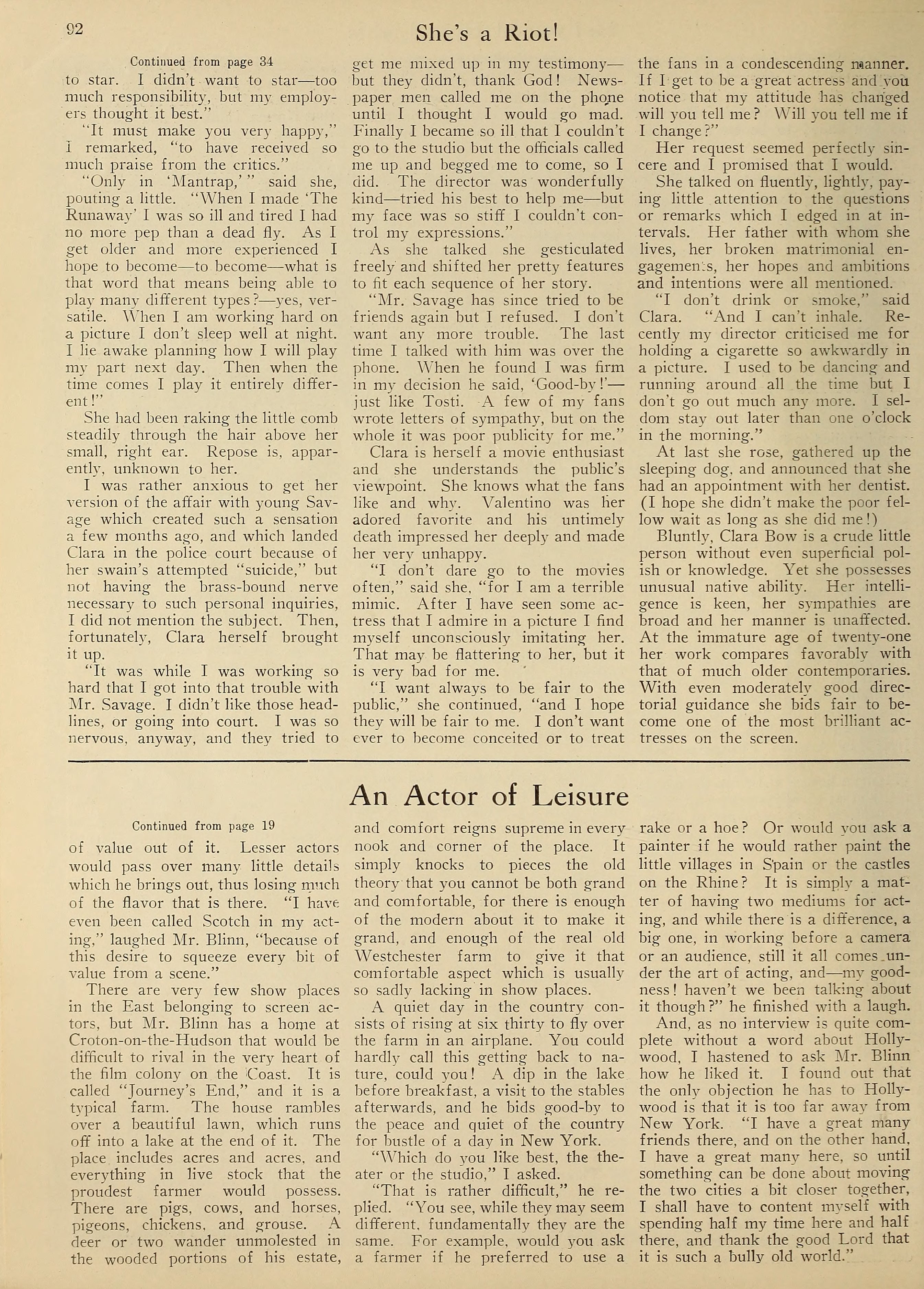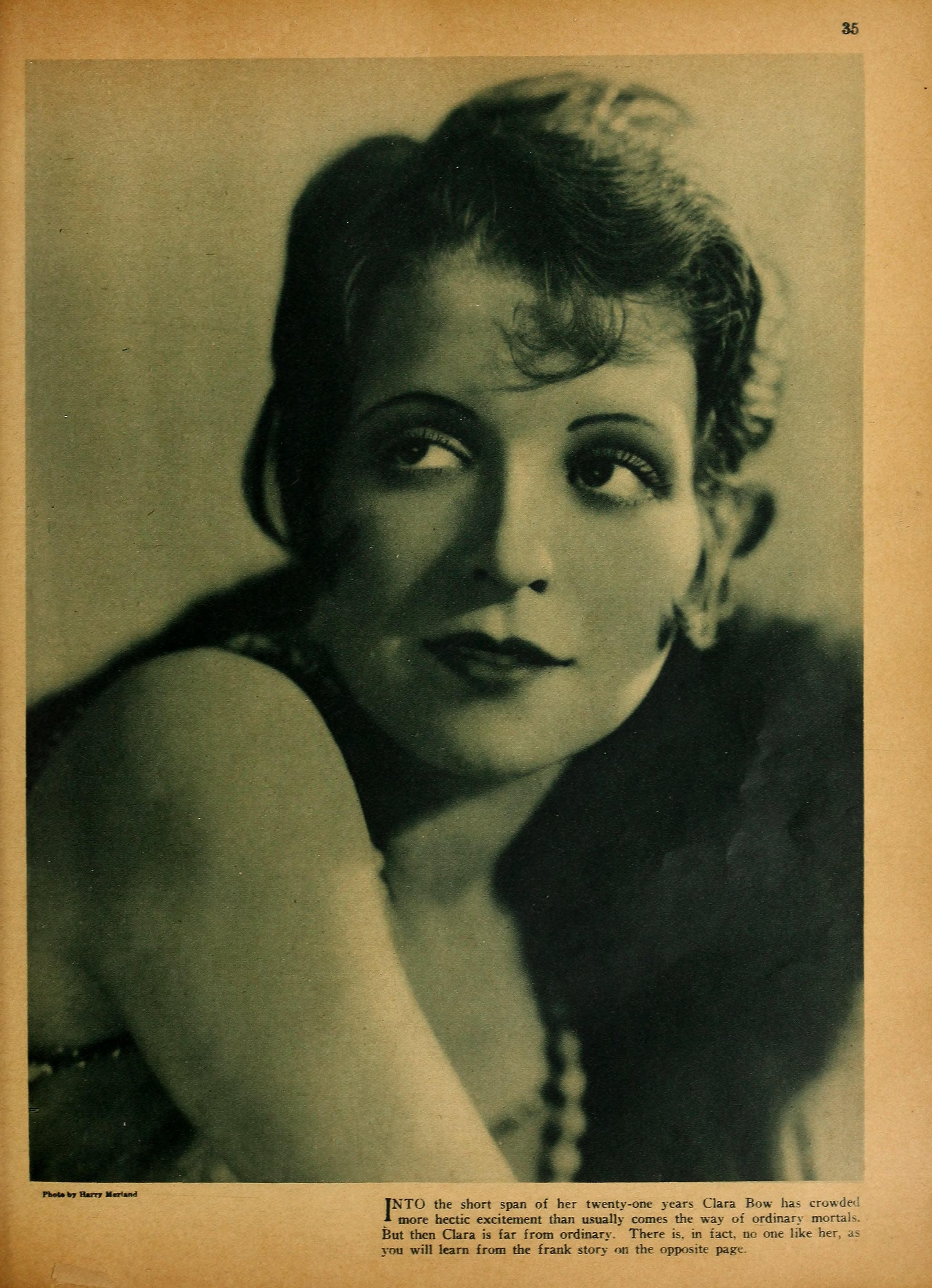Clara Bow — She’s a Riot! (1926) 🇺🇸

Since entering motion pictures four years ago life for Clara Bow has been one prolonged climax. True, her existence previous to becoming a film actress, though beset by poverty, was not entirely monotonous. It couldn’t have been!
by Madeline Glass
Clara is the sort of person to whom strange things inevitably would happen. No matter how drab or barren her surroundings might be, it is safe to assume that by her inherent zest and originality she would create therein a measure of interest.
At twenty-one she has known more excitement than the average person experiences in a lifetime. Indiscriminate friendships, strange contacts, an enormous salary, travel, work, play, publicity, headlines — a colorful, swirling, unnatural race, with little Clara holding the reins.
Sitting opposite her in the Famous Players-Lasky reception room I studied her wild little face and wondered what the years would bring to her.
My first sight of Clara in the daylight of the publicity office had been rather astonishing. She appeared in the doorway hatless, wide-eyed, excessively made up, her flaming-red hair in picturesque disorder, and with a small dog clasped to her breast. There was about her a suggestion of flight. Now, in the subdued light of the reception room her gay coloring and pretty dress made an attractive picture against the black chaise longue on which she reclined.
“What do you think of my dog?” she inquired, stroking him with a white hand, the finger nails of which were so long and sharp I wondered how she managed to undress without committing hara-kiri.
Before she could finish pointing out his admirable qualities the little dog curled up and went to sleep.
“You know,” Miss Bow continued, amiably, “a picture star is charged higher prices than other people. Take this dog, for instance. I paid fifty dollars for him and later the woman I bought him from told a friend that if she had known I was Clara Bow she would have made me pay one hundred and fifty. And I would have paid it, too.”
One imagines she would. She seems to be a generous youngster — too generous, perhaps, for her own financial good.
“I have a cold now,” she chatted on, “the second one in my whole life. I haven’t been a bit well lately. I am under the care of a doctor. He told me I didn’t have nearly enough red corpuscles — that’s what you call them, isn’t it, corpuscles? I’m taking iron.”
Fishing a little amber comb out of her pocket she began running it through her unruly locks.
“I don’t know what to do about my hair,” said she. “I’ve just had a windblown bob and now I am to play in a picture of the year 1918. Short bobs were unknown then.”
“Well,” I said, immediately becoming feline, “Blanche Sweet, you know, wore a smart shingle in a picture of 1914. So remember you shouldn’t feel so —”
“Maybe I can find some way to hide it,” said Clara, without waiting for me to finish. “I am playing a new type in this picture,” she went on, enthusiastically. “She is a nice little girl who adores a soldier. I am so glad to get away from flapper parts. I hate being called a flapper.”
She had gradually slipped down on the chaise longue and now she paused long enough to pull herself up to a sitting position.
“For a long time,” said she, “they made me play such punk parts that I was afraid they would kill me with the public. But I thought it over and decided it would be best to play each part as well as I could instead of sulking over my bad luck. Now I have a new contract at more than seventeen hundred a week and I am going to star. I didn’t want to star — too much responsibility, but my employers thought it best.”
“It must make you very happy,” I remarked, “to have received so much praise from the critics.”
“Only in Mantrap,” said she, pouting a little. “When I made The Runaway I was so ill and tired I had no more pep than a dead fly. As I get older and more experienced I hope to become — to become — what is that word that means being able to play many different types? — yes, versatile. When I am working hard on a picture I don’t sleep well at night. I lie awake planning how I will play my part next day. Then when the time comes I play it entirely different!”
She had been raking the little comb steadily through the hair above her small, right ear. Repose is, apparently, unknown to her.
I was rather anxious to get her version of the affair with young Savage which created such a sensation a few months ago, and which landed Clara in the police court because of her swain’s attempted “suicide,” but not having the brass-bound nerve necessary to such personal inquiries, I did not mention the subject. Then, fortunately, Clara herself brought it up.
“It was while I was working so hard that I got into that trouble with Mr. Savage. I didn’t like those headlines, or going into court. I was so nervous, anyway, and they tried to get me mixed up in my testimony — but they didn’t, thank God! Newspaper men called me on the phone until I thought I would go mad. Finally I became so ill that I couldn’t go to the studio but the officials called me up and begged me to come, so I did. The director was wonderfully kind — tried his best to help me — but my face was so stiff I couldn’t control my expressions.”
As she talked she gesticulated freely’ and shifted her pretty features to fit each sequence of her story.
“Mr. Savage has since tried to be friends again but I refused. I don’t want any more trouble. The last time I talked with him was over the phone. When he found I was firm in my decision he said, ‘Good-by!’ — just like Tosti. A few of my fans wrote letters of sympathy, but on the whole it was poor publicity for me.”
Clara is herself a movie enthusiast and she understands the public’s viewpoint. She knows what the fans like and why. Valentino [Rudolph Valentino] was her adored favorite and his untimely death impressed her deeply and made her very unhappy.
“I don’t dare go to the movies often,” said she, “for I am a terrible mimic. After I have seen some actress that I admire in a picture I find myself unconsciously imitating her. That may be flattering to her, but it is very bad for me.
“I want always to be fair to the public,” she continued, “and I hope they will be fair to me. I don’t want ever to become conceited or to treat the fans in a condescending manner. If I get to be a great actress and you notice that my attitude has changed will you tell me? Will you tell me if I change?”
Her request seemed perfectly sincere and I promised that I would.
She talked on fluently, lightly, paying little attention to the questions or remarks which I edged in at intervals. Her father with whom she lives, her broken matrimonial engagements, her hopes and ambitions and intentions were all mentioned.
“I don’t drink or smoke,” said Clara. “And I can’t inhale. Recently my director criticised me for holding a cigarette so awkwardly in a picture. I used to be dancing and running around all the time but I don’t go out much any more. I seldom stay out later than one o’clock in the morning.”
At last she rose, gathered up the sleeping dog, and announced that she had an appointment with her dentist. (I hope she didn’t make the poor fellow wait as long as she did me!)
Bluntly, Clara Bow is a crude little person without even superficial polish or knowledge. Yet she possesses unusual native ability. Her intelligence is keen, her sympathies are broad and her manner is unaffected. At the immature age of twenty-one her work compares favorably with that of much older contemporaries. With even moderately good directorial guidance she bids fair to become one of the most brilliant actresses on the screen.

Life is so eagerly lived by Clara Bow that she perches on the window sill of her home, high above the terraces, to get a bird’s-eye view of Hollywood.


Into the short span of her twenty-one years Clara Bow has crowded more hectic excitement than usually comes the way of ordinary mortals. But then Clara is far from ordinary. There is, in fact, no one like her, as you will learn from the frank story on the opposite page.
Photo by: Harry Morland
Collection: Picture Play Magazine, December 1926
